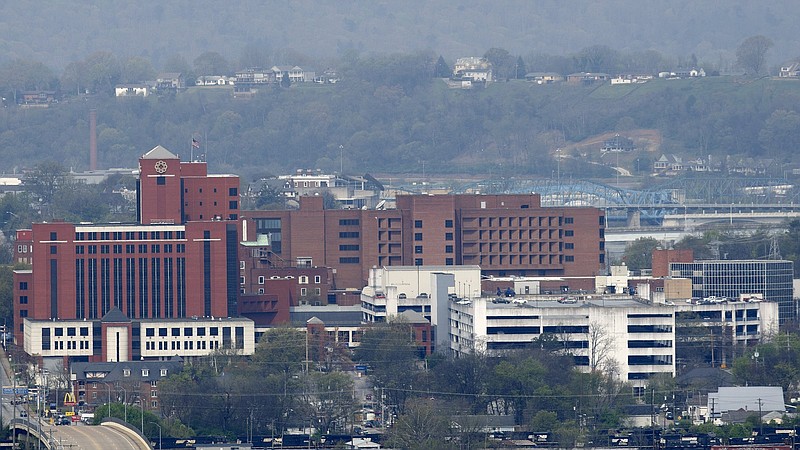Economic fallout from the COVID-19 pandemic continues to deal devastating blows to the hospital industry, particularly safety net hospitals such as Chattanooga's Erlanger Health System.
After eliminating 11 administrative leadership positions last week - including the CEOs of Children's Hospital at Erlanger and Erlanger Western Carolina Hospital - Erlanger management implemented another round of layoffs Friday affecting 93 non-clinical employees.
"As the region's only public safety net hospital system, Erlanger has borne the full brunt and financial impact of this pandemic in a way other health systems have not," reads an internal memo distributed to employees throughout the hospital system Friday.
The memo states Erlanger's "primary goal with these reductions is to reduce administrative cost without negatively impacting patient care.
"Our commitment is to remain steadfast about prioritizing our people, quality and safety, and operational excellence, while tackling our financial responsibilities directly," it goes on to say. "Nothing could have totally prepared us, or any health system, for the impact COVID-19 has had on our operations. With our dedicated and competent staff, we have been able to provide exceptional care to COVID-19 and other patients throughout this pandemic."
As a safety net hospital, Erlanger operated on thin margins before the COVID-19 pandemic. The health system last year provided approximately $135 million in uncompensated medical care from treating high volumes of uninsured and underinsured patients.
In the memo, Erlanger CEO Dr. Will Jackson said that continuing the hospital's mission while treating COVID-19 patients and losing significant revenue from the government mandate to pause elective surgeries - a critical source of income for hospitals - forced Friday's difficult decision.
Erlanger officials estimated that the public hospital saw a $35 million reduction in net patient revenue for the month of April due to temporarily suspending elective procedures, decreases in admissions and other coronavirus-related expenses.
Friday's layoffs mark the fourth round of staff and pay cuts at Erlanger since Jackson took over as CEO nine months ago.
When former Erlanger CEO Kevin Spiegel took the helm in 2013, the health system had fewer than 100 employees who were considered non-clinical managers and directors. The health system grew substantially under Spiegel, employing about 280 managers when Jackson became CEO in October.
The latest round of layoffs brings the number of non-clinical managers and directors back to around 100, Erlanger officials said.
The health system had more than 7,700 employees overall, as of its 2020 annual report.
Early in the pandemic, Erlanger furloughed some administrative employees, cut leadership pay, reduced overtime, suspended vacation accruals and retirement contributions and suspended job recruitment for administrative positions after COVID-19 preparations resulted in a 30 to 40% drop in revenue.
Gregg Gentry, Erlanger's chief administrative officer, said during an interview with the Times Free Press this week that Erlanger's expense reduction plan - particularly the pause in paid time off accruals - has been a key source of frustration among employees.
Jackson said in Friday's memo that on Monday, when the hospital board's budget and finance committee is scheduled to convene for a public meeting, he will share specific dates about reversing those cost reduction measures, such as when employees can expect to return to full-time work, have salaries restored and benefits reinstated.
Erlanger is far from alone in its struggles. Hospitals across the country have been forced to implement staff reductions and other cost cutting measures to ensure their long-term viability.
CommonSpirit Health - which operates 137 hospitals across 21 states, including the private, non-profit CHI Memorial Hospital in Chattanooga - finished its most recent quarter with a $1.4 billion loss, according to Becker's Hospital Review.
As of May 30, CHI Memorial officials estimate the health system had lost approximately $28 million since the pandemic began.
CHI Memorial spokeswoman Lisa McCluskey said that although the health system has not reduced any benefits and continues to contribute to retirement plans, management is adjusting staffing in response to the lower number of patients in the hospitals.
"We are flexing fixed and variable staff to respond to lower volumes. Our temporary expense reduction plan relies on effectively managing controllable expenses, limiting overtime in non-clinical areas and carefully reviewing recruitment for non-clinical positions to determine which positions may be delayed," McCluskey said by email, adding that they used some of the downtime to conduct specialized trainings.
The hospital has a system-wide labor pool - made up of employees where services are reduced or suspended - to source staffing around the health system, she said. Some employees are also using their paid vacation to offset income loss as they flex to respond to lower volumes.
Michael Ferguson, a spokesman for Parkridge Health System - which is part of the large, for-profit HCA Healthcare - shared an emailed statement from the hospital saying, "Parkridge Health has not laid off or furloughed a single caregiver due to the pandemic, and we hope to avoid doing so in the future."
Ferguson said in a separate message that the term "caregivers" applies to all types employees.
"Like other health systems across the country, Parkridge Health experienced a decrease in surgery and outpatient volume because of the pandemic, which led to a reduction of hours for many of our colleagues," the statement reads. "For those with reduced hours, we have made every effort to redeploy them to other opportunities so they can continue working. Those who were not able to be redeployed continued to receive 70 percent of their base pay for up to 13 weeks."
Parkridge did not respond to a question of how much money the health system has lost due to COVID-19.
Contact staff writer Elizabeth Fite at efite@timesfreepress.com or follow her on Twitter @ecfite.
